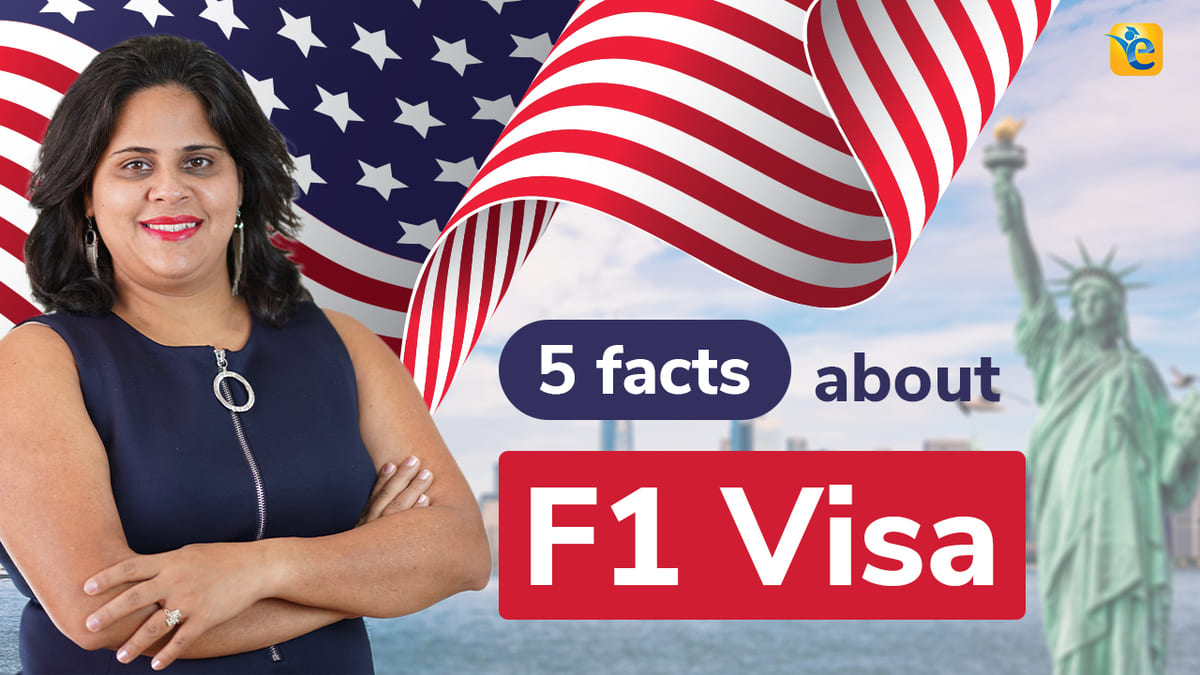Congrats on having received admissions offer from a US university. Your next big milestone is navigating the visa process. Most international students applying to US universities need to possess an F1 (or “student”) visa in order to legally study in the United States. An F1 visa is far from a guarantee as 15-20% of applicants get rejected by visa officers every year despite having admissions offers from US universities. But, Fret not.
In this article, Shaarang, a current MBA student at UNC Kenan-Flagler Business School, outlines a few key facts to know about the F1 visa process from his own experience of applying for the visa. You can also watch this short video:
- What is an F1 student visa?
- Why should you apply for the F 1 visa?
- When should you apply for the F1 visa?
- What documents do you need for the F1 visa application?
- How should you apply for the F1 visa?
- Booking a date for your appointment
- F1 visa interview
- What can you expect after the visa interview?
- FAQs – F1 student visa
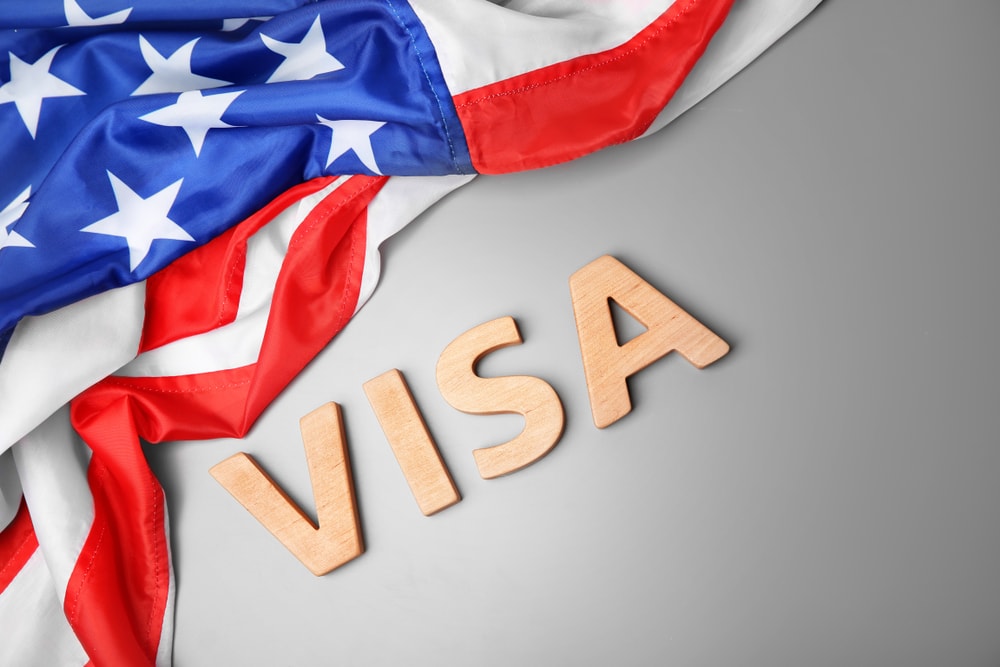
What is an F1 student visa?
An F1 visa allows international students to pursue a full-time education in the United States. With an F 1 visa, you can study full-time in a:
- University or college
- High School
- Private elementary school
- Seminary
- Conservatory
- Language training program
Why should you apply for the F 1 visa?
You must apply for an F1 Visa if:
- You need to stay in the US for more than 90 days to complete your academic programs.
- You want to gain experience in your field of study after graduating, an F 1 visa will allow you to participate in the Optional Training Program (OPT)
- Your institution is SEVP (Student and Exchange Visitor Program) certified.
A student Visa will let you attend a top business school like Harvard Business School and Stanford GSB. Learn more on how to get into a top US business school.
Learn what can international students expect from the Biden administration.
When should you apply for the F1 visa?
You should reserve a 3-month window for your entire F1 visa process. The wait times for visa appointments fluctuate depending on what part of the world you live in and can range from 1 week to 2 months, so it is prudent to err on the side of caution.
It is also best to select a visa appointment date that is not too close to your preferred departure date. Assuming that you are approved for the visa, you will not walk out of the embassy or consulate with a stamped passport.
Your passport will be retained by the visa officer and may take between 7 and 14 days for the visa to get stamped on your passport and arrive at your doorstep. It is critical that you take these administrative processing times into account when booking your visa appointment.
What documents do you need for the F1 visa application?
Once you have booked your visa appointment, you must start collecting documents that prove that you can support your education in the United States.
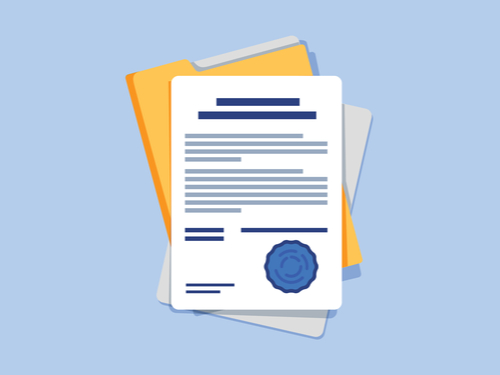
A visa officer may ask for any of these documents during your interview and it is critical that have these proofs handy; on that note, it is a best practice to organize your documents in a transparent accordion folder. Such folders are among the only ones permitted inside the embassy gates.
The documents you collect should include:
- Official documents:
- Valid Passport
- Valid I-20
- Visa Appointment Fee Receipt
- Visa Application Forms (DS-160)
- Interview Appointment Letter
- SEVIS fee receipt
- 2 recent passport size photographs
- University documents:
- All original degree certificates (school, undergraduate, master if any, etc.)
- 10th-grade final mark sheet
- 10+2 grade final mark sheet
- GRE/GMAT Score Report
- TOEFL/IELTS Score Report
- Extracurricular certificates (if any)
- US University offer letter and scholarship letter (if any)
- Financing documents:
- Proof of liquid funds to cover tuition plus living expenses for the first year of the course
- Savings account bank balance with 12 months transactions
- Student loan documents (if any)
- Fixed deposits
- Affidavit of support from sponsors (parents, family members, etc.)
- 3 years of IT return of sponsors
- Proof of fixed assets (property papers, etc.)
- Proof of liquid funds to cover tuition plus living expenses for the first year of the course
Are you planning to enroll in a US business school? Let us help you conquer the first step of the process i.e., taking the GMAT. Take a free GMAT mock to understand your baseline score and start your GMAT prep with our free trial. We are the most reviewed online GMAT Prep company with 2060+ reviews on GMATClub.
How should you apply for the F1 visa?
- Step 1 – Apply to a SEVP approved school.
- Step 2 – You’ll receive an I-20 form from the school, once you accept the offer of admission. The school will enter your name in SEVIS (Student and exchange visitor information system)
- Step 3 – Pay the SEVIS I-901 fee of US $350
- Step 4 – Fill the online nonimmigrant visa application form DS-160. Pay the F 1 visa fee of US $160.
- Step 5 – Print and keep the DS-160 barcode. Schedule an appointment at your local US Embassy or Consulate.
- Step 6 – Prepare the following documents for your visa interview
- A valid passport
- Form DS-160 confirmation page
- Application fee payment receipt
- Form I-20 issued by the school
- Academic transcripts and standardized test scores
- Proof of health insurance
- Financial documents to prove that you have enough money for your living expenses
- Proof that you intend to return to your home country after graduating
- Step 7 – Attend your visa interview on the scheduled day
Choosing the right MBA program for you is very important if you want to derive the maximum benefit. Learn the 6-step process of choosing the right business school.
Booking a date for your appointment
When booking a date for your visa appointment, you will be asked to book two different dates.
The first date will be for your biometric appointment and the second date will be for the visa interview. Your biometric center and the embassy or consulate (where the visa interview will be held) are two separate premises and may be located in different parts of the city. You should research this before booking your appointments.
For both appointments show up 30-minutes before the scheduled time to ensure a smooth process.
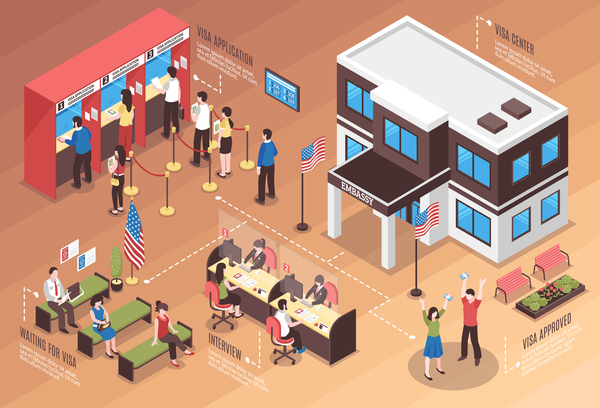
For your biometric appointment, you may be dressed in casual attire but be sure to carry the documents in the “Official documents” section of your accordion folder.
You will be asked to fill out some basic forms and you will need to log in your finger and thumb prints and pose for a picture. Assuming there is no wait time, this appointment lasts 15-minutes and is fairly straightforward.
For your visa interview, you will report to a US embassy or consulate. Please carry all the documents mentioned above and dress in business casual attire. It is important to make a good impression during the visa interview. You will be asked to wait in a waiting area until your name is called when you will step into a booth for your visa interview.
F1 visa interview
The visa interview itself lasts for less than two minutes. The visa officers are trained to detect deception and are asked to err on the side of safety and reject the application if they feel unsure about an applicant — they are asked to not give applicants second chances.
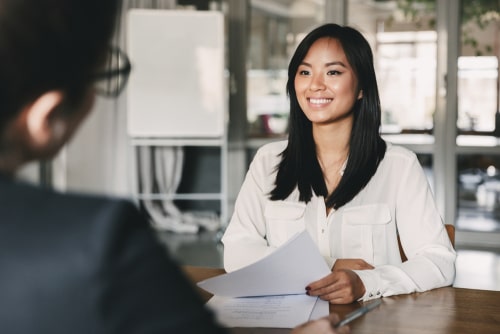
Recognizing that a visa interview is a high stakes situation, it is important to prepare rigorously and is also important for your answers to drive home two points: first, that you want the visa to build skills and not accept a job in the US, and second, that you do intend to return to your home country when your stint in the US comes to an end. (A student visa is a non-immigrant visa, so it is critical to emphasize that you do not wish to immigrate to the United States — any doubts on this front will surely lead to rejection.)
Most common F1 visa interview questions
Some commonly asked F1 visa interview questions include:
- Why do you want to study in the US?
- Why do you want to study at this university?
- What are your plans after graduation?
- Who will finance your education?
- Do you have relatives in the US?
What can you expect after the visa interview?
Your visa interview will have one of three outcomes: “Visa Approved”, “Visa Rejected”, “Visa kept on hold under administrative processing”
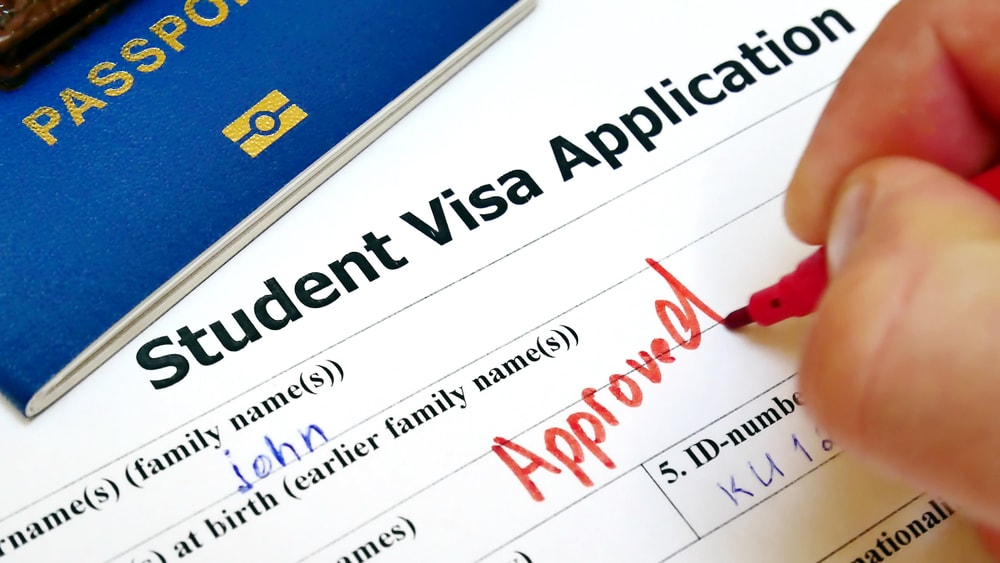
If your visa is approved, your passport will be retained by the visa officer and may take between 7 and 14 days for the visa to get stamped on your passport and arrive at your doorstep.
If your visa is rejected, your passport will be returned to you immediately and you may book another appointment and interview with a different visa officer who may approve your visa.
If your visa is placed under administrative processing, your passport is retained and sent to the biometrics center, where you are required to produce additional documents, after which your visa will be stamped and your passport returned to you.
FAQs – F1 student visa
No. F 1 visa only allows you to travel. However, your spouse and children under 21 can travel on an F 2 visa.
Your spouse cannot work on an F 2 visa. However, your children can enroll in primary or secondary school programs.
You can. You will need to transfer your SEVIS record and get another I-20 form from the new school within 15 days of the transfer.
You can travel back to your home country or another country as long as you return to the US within 5 months.
You can, only if you are authorized for an OPT (Optional Practical Training) program. With an OPT you can stay back for 12 more months (36 months in the case of STEM students). In case you are not authorized for the OPT, you’ll only have an additional 60 days to stay in the US after academic program completion.
You can transfer your F 1 visa to H1-B or a green card. To get an H1-B visa you need to find a sponsor. An H1-B visa allows you to work for up to 6 years.
If you plan to do an MBA from the USA, you need to score well on the GMAT.
If you are planning to take the GMAT, we can help you with a personalized study plan and give you access to quality online content to prepare.
Are you planning to take the GMAT? Take a free GMAT mock to understand your baseline score and start your GMAT prep with our free trial. We are the most reviewed online GMAT Prep company with 2060+ reviews on GMATClub.


